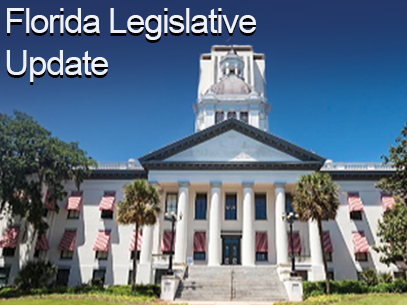
By: Rosa M. de la Camara, Esq., Becker & Poliakoff
The Florida Legislature is commencing another busy legislative session. We are aware of possible legislation to criminalize fraudulent Emotional Support Animal requests and to help communities and local governments regulate short term rental activity. While we monitor this session’s progress, it is a good time to review last year’s most important community association laws to ensure your association is in compliance. The outline below highlights some of the 2018 laws you need to know if you are serving on a community association board.
Condominium and Cooperative Official Records
- The minutes of all meetings of the association, the board of administration, and the units owners must be permanently maintained from the inception of the association (as opposed to 7 years).
- The amount of time that condominium and cooperative associations must respond to a written records request is extended from 5 business days to 10 business days.
Condominium Association Websites
- The date that condominium associations of 150 or more units must post some of its official records on a website was extended to January 1, 2019. Are you in compliance?
- The statute was modified to allow the Association to post a “list” or “summary” of certain contracts and bids. Keep in mind that bids are now considered official records of the Association. The summaries of bids for materials, equipment or services which exceed $500 must be maintained on the website for 1 year. In lieu of the summaries, complete copies of the bids may be posted.
Condominium and Cooperative Meeting Notices
- In addition to any of the authorized means of providing notice of a board meeting or owners’ meeting, the association may, by rule, adopt a procedure for conspicuously posting meeting notices and the agenda on a website serving the association. The rule must include a requirement that the association send an electronic notice in the same manner as a notice for a meeting of the members, which must include a hyperlink to the website where the notice is posted, to unit owners whose e-mail addresses are included in the association’s official records. Note that posting notice on an association’s website is not “in lieu” of physical posting. Therefore, even if the notices are posted on a website, the notice must also be posted on the condominium property.
Condominium Board Member Term Limits
- The prior condominium association term limit language was amended to provide that no board member may serve more than eight consecutive years, unless approved by an affirmative vote of two-thirds of the voting interests voting in the election or unless there are not enough eligible candidates to fill the vacancies.
- There had been a question whether the terms of service counting toward the 8 year limitation should begin to be counted beginning with board seats up for election after July 1, 2018 (when the law became effective) or retroactively. Subsequently, the Division of Florida Condominiums, Timeshares, and Mobile Homes issued a Declaratory Statement, In Re: Petition for Declaratory Statement, The Apollo Condominium Association, Inc., DS 2018 – 035 (September 14, 2018), where the Division concluded that the statute would apply retroactively. It should be noted that many attorneys practicing in this area differ with this conclusion as Florida legislation is presumed to operate prospectively.
E-Mail Communication For Condominiums, Cooperatives, HOAs
- Members of the board may use e-mail as a means of communication but may not cast a vote on an association matter via e-mail (These provisions regarding board member eligibility and email communication by board members have been in the Condominium Act for a number of years and have now been added to the Cooperative Act and Homeowners’ Association Act).
Electric Vehicles In Condominiums
- This statute creates a new provision stating that a unit owner may not be prohibited from installing an electric vehicle charging station within the boundaries of the unit owner’s limited common element parking area, under certain circumstances.
- The electricity for the electric vehicle charging station must be separately metered and payable by the unit owner installing such charging station.
- The unit owner who is installing the charging station is responsible for the costs of installation, operation, maintenance, and repair, including, but not limited to, hazard and liability insurance.
- The association may require the unit owner to comply with installation requirements and safety precautions as well as other requirements to protect the Association.
Conflicts of Interests of Condominium Board Members
- The Statute was amended in several places, including to provide that if a director or director’s relative proposes to engage in an activity that is a conflict of interest, there must be certain disclosures and same shall be included in the written minutes of the meeting.
- The approval of any such contract or transaction requires an affirmative vote of two-thirds of all other directors present.
- At the next regular or special meeting of the members, the existence of the contract or other transaction shall be disclosed to the members. It can then be canceled by a majority vote of the members present.
- If the contract is canceled, the association is only liable for the reasonable value of the goods and services provided up to the time of cancellation and is not liable for any termination fee, liquidated damages, or other form of penalty for such cancellation.
- If the contract is canceled, the association is only liable for the reasonable value of the goods and services provided up to the time of cancellation and is not liable for any termination fee, liquidated damages, or other form of penalty for such cancellation.
Rosa de la Camara concentrates her practice on representing community associations and has immersed herself in the many complex issues facing Boards of Directors, unit owners, managers and state and local policymakers for more than thirty years. Her duties encompass a general counsel role including drafting, analysis of issues and recommended course of action, prosecuting violations, attending administrative hearings and organizing elections. She also represents Hotel Condominiums and is familiar with the unique issues faced by these. Ms. de la Camara is also one of only 129 attorneys statewide who is a Board Certified Specialist in Condominium and Planned Development Law.
Ms. de la Camara has authored many articles on subjects related to the practice of Community Association Law in English and Spanish. She has been a featured speaker on local Spanish and English radio and television shows and at public service seminars for condominium and homeowner associations. She is a featured panelist at symposiums on Community Association Law and is a frequent media resource on issues impacting the world of community associations.
You can reach Rosa at (305) 260-1011 or via email at rd*********@***********rs.com
